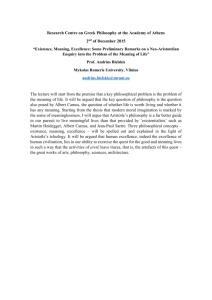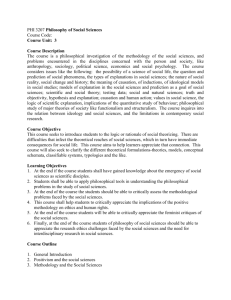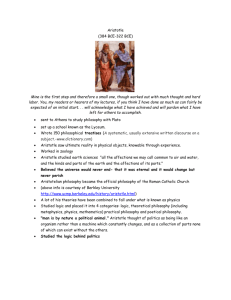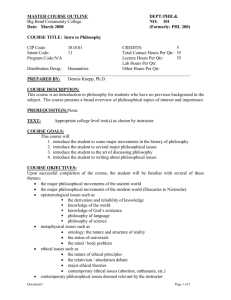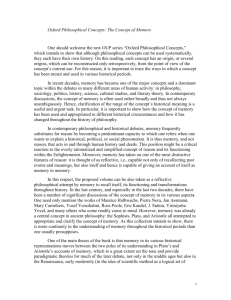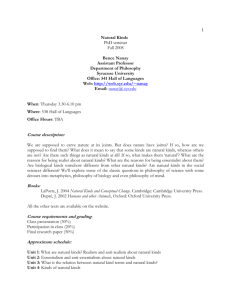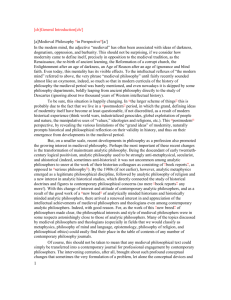W8506
advertisement
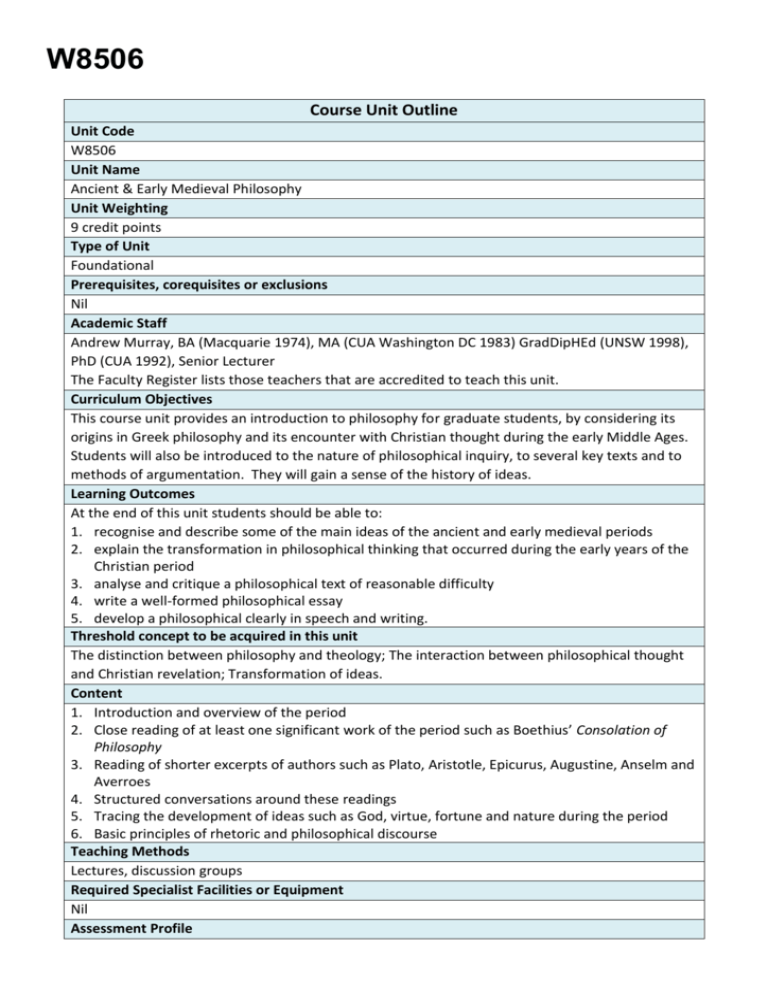
W8506 Course Unit Outline Unit Code W8506 Unit Name Ancient & Early Medieval Philosophy Unit Weighting 9 credit points Type of Unit Foundational Prerequisites, corequisites or exclusions Nil Academic Staff Andrew Murray, BA (Macquarie 1974), MA (CUA Washington DC 1983) GradDipHEd (UNSW 1998), PhD (CUA 1992), Senior Lecturer The Faculty Register lists those teachers that are accredited to teach this unit. Curriculum Objectives This course unit provides an introduction to philosophy for graduate students, by considering its origins in Greek philosophy and its encounter with Christian thought during the early Middle Ages. Students will also be introduced to the nature of philosophical inquiry, to several key texts and to methods of argumentation. They will gain a sense of the history of ideas. Learning Outcomes At the end of this unit students should be able to: 1. recognise and describe some of the main ideas of the ancient and early medieval periods 2. explain the transformation in philosophical thinking that occurred during the early years of the Christian period 3. analyse and critique a philosophical text of reasonable difficulty 4. write a well-formed philosophical essay 5. develop a philosophical clearly in speech and writing. Threshold concept to be acquired in this unit The distinction between philosophy and theology; The interaction between philosophical thought and Christian revelation; Transformation of ideas. Content 1. Introduction and overview of the period 2. Close reading of at least one significant work of the period such as Boethius’ Consolation of Philosophy 3. Reading of shorter excerpts of authors such as Plato, Aristotle, Epicurus, Augustine, Anselm and Averroes 4. Structured conversations around these readings 5. Tracing the development of ideas such as God, virtue, fortune and nature during the period 6. Basic principles of rhetoric and philosophical discourse Teaching Methods Lectures, discussion groups Required Specialist Facilities or Equipment Nil Assessment Profile Assessment tasks are designed both to help students attain the unit outcomes and to enable teachers to assess student attainment. In this unit, assessment of student achievement with respect to the Learning Outcomes will be based on: 1. Demonstration of knowledge of the content of the readings (e.g. written quizzes or oral responses). [Outcomes 1 and 3] 2. Interpretation of texts and expression of their meaning (e.g. short essay). [Outcomes 1 and 3] 3. Close analysis of significant philosophical ideas or issues of the period in context (e.g. essay or exam). [Outcomes 2, 4 and 5] Representative References 1. Aristotle. Ethics. Translated by J. A. K. Thomson. London: Penguin, 2004. 2. Barnes, Jonathan (ed. The Cambridge Companion to Aristotle. Cambridge: Cambridge University Press, 1995. 3. Boethius. The Consolation of Philosophy. Translated by V. E. Watts. London: Penguin, 1999. 4. Brown, Peter. Augustine of Hippo: A Biography. Revised edition. Berkeley: University of California Press, 2000. 5. Fakhry, Majid. Averroes: His Life, Works and Influence. Oxford: Oneworld, 2001. 6. Inglis, John. Medieval Philosophy and the Classical Tradition in Islam Judaism and Christianity. London: RoutledgeCurzon, 2003. 7. Lanngstrom, Anna. Loving the Fine: Virtue and Happiness in Aristotle’s Ethics. Notre Dame: University of Notre Dame Press, 2006. 8. Maurer, Armand A. Medieval Philosophy. Toronto: Pontifical Institute of Mediaeval Studies, 1982. 9. Plato. The Last Days of Socrates. Translated by Hugh Tredennick and Harold Tarrant. London: Penguin, 2003. 10. Sharples, R. W. Stoics, Epicureans and Sceptics: An Introduction to Hellenistic Philosophy. London: Routledge, 1996. 11. Shields, Christopher. Aristotle. London: Routledge, 2007. 12. Stumpf, Samuel Enoch & James Fieser. Socrates to Sartre: A History of Philosophy. 7th edition. New York: McGraw-Hill, 2003.

